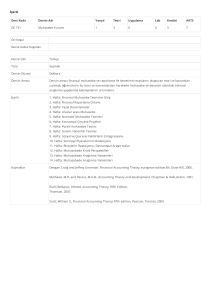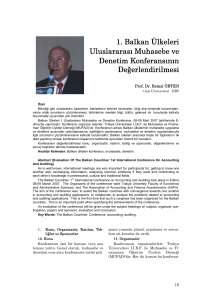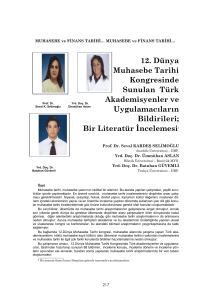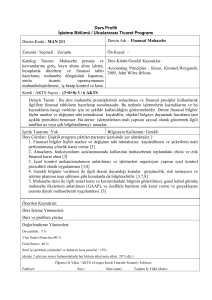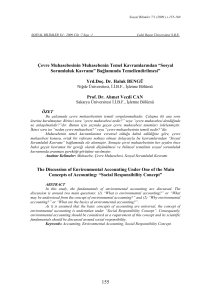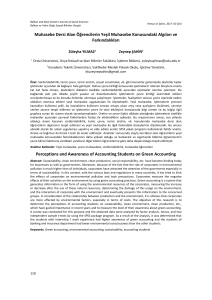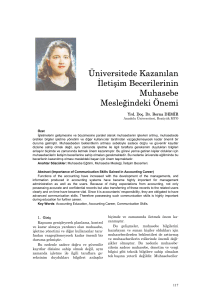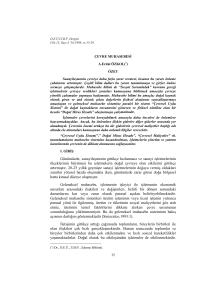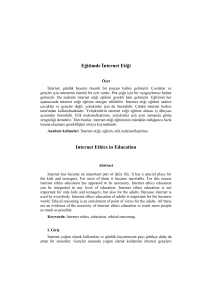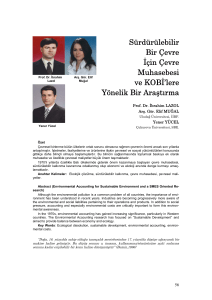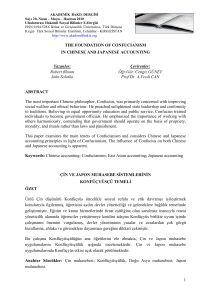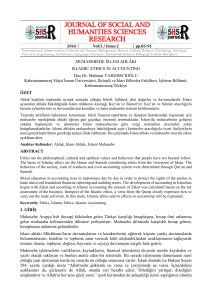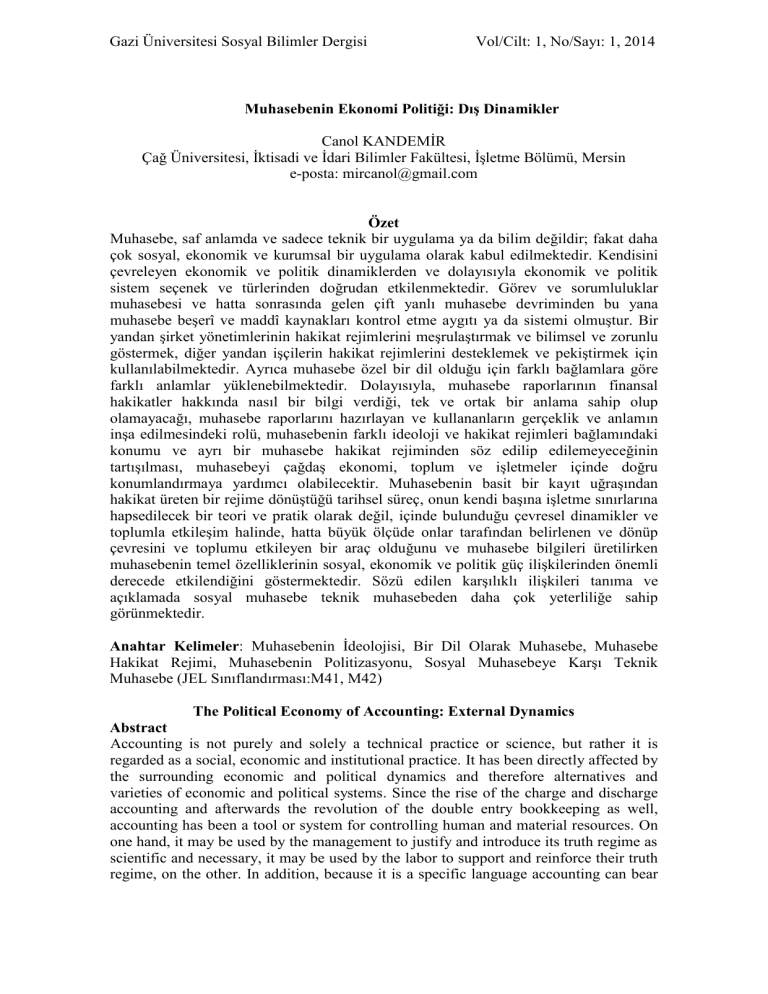
Gazi Üniversitesi Sosyal Bilimler Dergisi
Vol/Cilt: 1, No/Sayı: 1, 2014
Muhasebenin Ekonomi Politiği: Dış Dinamikler
Canol KANDEMİR
Çağ Üniversitesi, İktisadi ve İdari Bilimler Fakültesi, İşletme Bölümü, Mersin
e-posta: [email protected]
Özet
Muhasebe, saf anlamda ve sadece teknik bir uygulama ya da bilim değildir; fakat daha
çok sosyal, ekonomik ve kurumsal bir uygulama olarak kabul edilmektedir. Kendisini
çevreleyen ekonomik ve politik dinamiklerden ve dolayısıyla ekonomik ve politik
sistem seçenek ve türlerinden doğrudan etkilenmektedir. Görev ve sorumluluklar
muhasebesi ve hatta sonrasında gelen çift yanlı muhasebe devriminden bu yana
muhasebe beşerî ve maddî kaynakları kontrol etme aygıtı ya da sistemi olmuştur. Bir
yandan şirket yönetimlerinin hakikat rejimlerini meşrulaştırmak ve bilimsel ve zorunlu
göstermek, diğer yandan işçilerin hakikat rejimlerini desteklemek ve pekiştirmek için
kullanılabilmektedir. Ayrıca muhasebe özel bir dil olduğu için farklı bağlamlara göre
farklı anlamlar yüklenebilmektedir. Dolayısıyla, muhasebe raporlarının finansal
hakikatler hakkında nasıl bir bilgi verdiği, tek ve ortak bir anlama sahip olup
olamayacağı, muhasebe raporlarını hazırlayan ve kullananların gerçeklik ve anlamın
inşa edilmesindeki rolü, muhasebenin farklı ideoloji ve hakikat rejimleri bağlamındaki
konumu ve ayrı bir muhasebe hakikat rejiminden söz edilip edilemeyeceğinin
tartışılması, muhasebeyi çağdaş ekonomi, toplum ve işletmeler içinde doğru
konumlandırmaya yardımcı olabilecektir. Muhasebenin basit bir kayıt uğraşından
hakikat üreten bir rejime dönüştüğü tarihsel süreç, onun kendi başına işletme sınırlarına
hapsedilecek bir teori ve pratik olarak değil, içinde bulunduğu çevresel dinamikler ve
toplumla etkileşim halinde, hatta büyük ölçüde onlar tarafından belirlenen ve dönüp
çevresini ve toplumu etkileyen bir araç olduğunu ve muhasebe bilgileri üretilirken
muhasebenin temel özelliklerinin sosyal, ekonomik ve politik güç ilişkilerinden önemli
derecede etkilendiğini göstermektedir. Sözü edilen karşılıklı ilişkileri tanıma ve
açıklamada sosyal muhasebe teknik muhasebeden daha çok yeterliliğe sahip
görünmektedir.
Anahtar Kelimeler: Muhasebenin İdeolojisi, Bir Dil Olarak Muhasebe, Muhasebe
Hakikat Rejimi, Muhasebenin Politizasyonu, Sosyal Muhasebeye Karşı Teknik
Muhasebe (JEL Sınıflandırması:M41, M42)
The Political Economy of Accounting: External Dynamics
Abstract
Accounting is not purely and solely a technical practice or science, but rather it is
regarded as a social, economic and institutional practice. It has been directly affected by
the surrounding economic and political dynamics and therefore alternatives and
varieties of economic and political systems. Since the rise of the charge and discharge
accounting and afterwards the revolution of the double entry bookkeeping as well,
accounting has been a tool or system for controlling human and material resources. On
one hand, it may be used by the management to justify and introduce its truth regime as
scientific and necessary, it may be used by the labor to support and reinforce their truth
regime, on the other. In addition, because it is a specific language accounting can bear
Gazi Üniversitesi Sosyal Bilimler Dergisi
Vol/Cilt: 1, No/Sayı: 1, 2014
different meanings in different contexts. For this reason, a discussion of how accounting
reports disclose information about the financial truths, whether they have a common and
exclusive meaning to the users, the role of the financial table preparers and users on
constructing the truth and meaning, the positioning of accounting within the context of
different ideologies and truth regimes and whether a separate accounting truth regime is
possible could help rightly place accounting into modern economies, societies and the
corporate world. The historical process through which accounting has evolved from a
simple bookkeeping job into a regime constructing the financial truths reveals that
accounting is not a theory and practice that can be confined only to the boundaries of
the firm, on the contrary it is a tool interacting with, even largely formed by the external
dynamics in which it operates and the society, and in turn having an impact upon its
environment and the society and that in producing accounting information essential
features of accounting are substantially affected by social, economic and political power
relations. In diagnosing and disclosing such interrelationships cited above, social
accounting seems to have more capability than technical accounting.
Key Words: Ideology of Accounting, Accounting as a Language, Accounting Truth
Regime, Politicization of Accounting, Social versus Technical Accounting (JEL
Classification: M41, M42)

